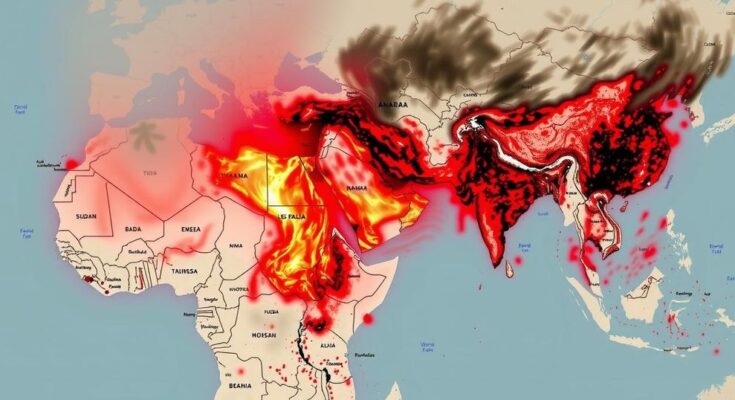The ongoing conflicts in Sudan, Myanmar, and the Democratic Republic of the Congo have resulted in severe humanitarian crises marked by widespread violence and human rights violations. In Sudan, intensifying combat has led to mass civilian displacement and food insecurity. Myanmar’s military junta continues oppressive tactics, while the DRC sees the renewal of peacekeeping missions amidst increasing armed group violence. Global response mechanisms must evolve to effectively protect civilians and promote sustainable peace in these regions.
The conflict in Sudan continues to wreak havoc as it enters its 20th month, with severe humanitarian implications for the civilian populace. In early January, the Sudanese Armed Forces intensified their assault against the Rapid Support Forces in Khartoum, resulting in civilian casualties from airstrikes. Reports from the Office of the UN High Commissioner for Human Rights indicate alarming death tolls, particularly in conflict-affected Darfur, where over 24.6 million individuals are now facing acute food insecurity amidst increasingly violent conditions.
In Myanmar, the military junta’s repressive measures persist as they release census results amid ongoing violence between the military and ethnic resistance groups. The junta’s failure to acknowledge the rights of ethnic minorities undermines the credibility of any electoral undertakings. Systematic restrictions on humanitarian aid have left countless civilians at risk of starvation, exacerbating an already dire situation. Despite these challenges, some resistance forces express readiness for political dialogue focused on justice and self-determination.
The UN Security Council has recently renewed the mandate for its peacekeeping mission in the Democratic Republic of the Congo. Increased territorial control by armed groups, particularly the March 23 Movement, alongside extensive human rights violations, underscores the continued necessity for MONUSCO’s presence. The DRC has initiated legal action against corporations allegedly involved in conflict mineral sourcing, highlighting corporate accountability’s role in preventing atrocities. A multifaceted approach combining effective governance, military assistance restrictions, and sustainable resource management is imperative to halt the cycle of violence.
The report details three significant ongoing humanitarian crises in Sudan, Myanmar, and the Democratic Republic of the Congo. In Sudan, armed conflict has escalated, causing mass casualties and a dire humanitarian situation, with millions facing food insecurity. Myanmar remains unstable after a military coup, prompting ongoing violence and human rights abuses against minority groups. The Democratic Republic of the Congo faces a resurgence of conflict, with armed groups committing human rights violations amidst competition over natural resources. Each situation is complicated by international dynamics, as global responses and humanitarian efforts are hindered by local conflicts and governance issues. The urgent need for protective measures and a restructuring of international aid frameworks is evident, as atrocities continue to evolve in these regions. The complexities of each context necessitate a multipronged strategy that prioritizes peace, accountability, and the protection of civilian populations over military solutions.
In summary, the crises in Sudan, Myanmar, and the Democratic Republic of the Congo exemplify the urgent need for concerted international action to protect civilians and address humanitarian needs. The persistent violence and human rights violations demand a robust response from the international community, emphasizing the necessity for ceasefires, compliance with humanitarian law, and the promotion of justice and self-determination for affected populations. Failure to act decisively risks further escalation and deepening of these tragedies on a global scale.
Original Source: www.globalr2p.org




